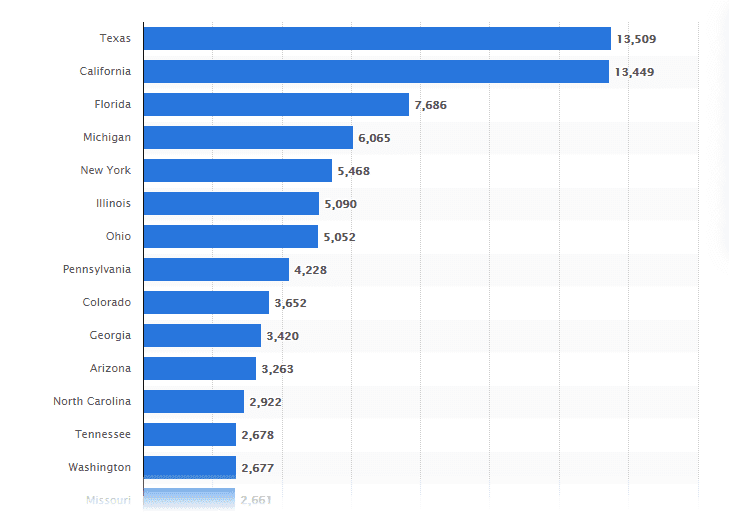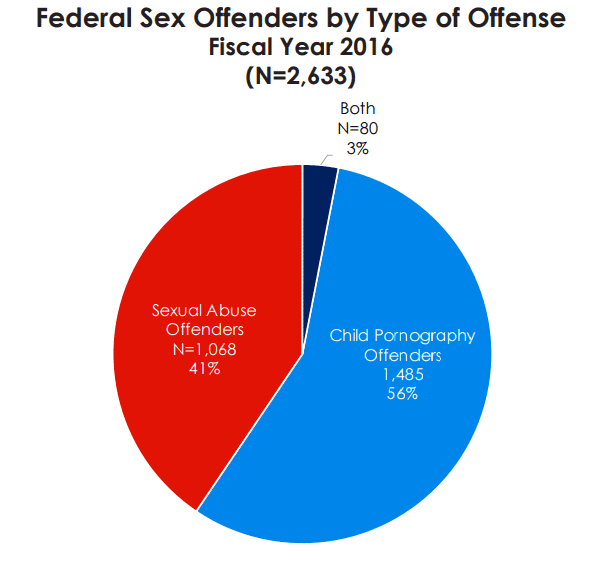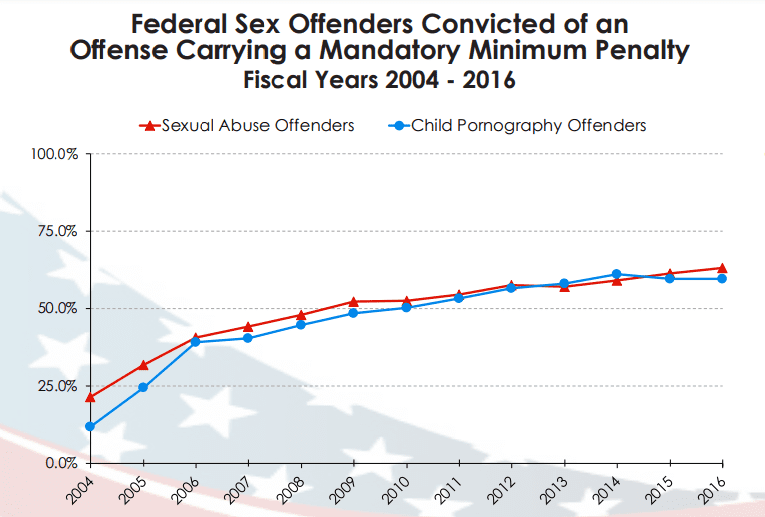Sex offenses are among the most severe in Texas. If you or someone you love is accused of a sex crime in this state, they will face, if convicted, harsh sentencing and extreme sex offender registration upon release. Unfortunately Texas ranks high for the number of sex crimes compared to other parts of the U.S.
Recent FBI statistics found that there are 55.2 sexual assaults and rapes for every 100,000 people in our state. That makes Texas 15th most dangerous state in this regard. Our statistics are even worse for forcible rape, where Texas has the highest number of these cases in the nation.
Typically, charges for this type of crime is charged and prosecuted at the state level — but not always the case. Sex crimes are sometimes prosecuted at both the state and federal levels, and in certain circumstances, the federal government will assume jurisdiction in sex offense case, particularly if they involve intestate cpommerce or child sex trafficking schemes.
Why does this matter?
Because federal criminal penalties and the U.S. Sentencing Guidelines are often result in a more lengthy sentence that must be served without the benefit of parole and extremely sparse goodtime benefits – especially with an offense that requires imposition of a when mandatory minimum sentence.
Are federal sex crimes different from state sex crimes?
Yes and no. Read on to find out more about what federal sex crimes are and how they are prosecuted in this comprehensive guide.
State or Federal Sex Crime?
Many people wonder why a sex crime would be prosecuted at the federal level and not the state level. The truth is that sex offenses are governed by both state and federal laws, which creates differences in how they are prosecuted.
Sex crimes, like any other crime, are prosecuted in the jurisdiction where the crime takes place. Since some sex crimes are considered criminal violations on both the federal and state level, the federal government will assume jurisdiction only when there are special circumstances, such as online child sex trafficking or human trafficking schemes with forced sexual components.
Most often it is the seriousness, public safety and magnitude of a crime that prompts federal jurisdiction – and it’s not a violation of your constitutional rights when that does occur.
Federal courts are granted powers by the United States Constitution to decide what cases they want to try. They don’t have to take on a crime they have jurisdiction over, but are more likely to take on certain types of cases. These cases include those where the internet was used, the activity crossed over state lines, or impacted a minor youth or child.
The types of sex crimes most typically prosecuted by federal courts include:
- Exploitation of minors
- Buying or selling children
- Possession of child pornography
- Distribution of child pornography
- Online solicitation of a minor especially if it crossed state lines
- Aggravated rape
- Aggravated sexual abuse
- The transportation of minors between states or countries with the entire to engage them in criminal sexual activity
This is not a comprehensive list, but it gives you an idea of the types of sex crimes that federal prosecutors will pursue in federal court.
Federal Sex Crimes Often Involve Minors
A range of offenses can be prosecuted in federal court under federal law. Many sex crimes involving children are prosecuted at the federal level. A minor is defined as any person under the age of 18, but frequently the child in question may actually be younger than 16.
Sex crimes against minors prosecuted in federal court can be any of these:
- Child rape or sexual assault
- Sexual exploitation of a child by anyone who bribes, entices, or coerces the minor into sexually explicit conduct or with the intention of depicting the minor in a sexual situation that can be transmitted to others, such as online or through photographs
- Sexual abuse of a ward or minor
- Sale or purchase of a child for the purpose of sex
- Distribution or possession of child pornography, which is classified as material that portrays the sexual exploitation of a minor (i.e. videos, books, films, or magazines) and can also include sharing digital or actual material
Mandatory Minimum Penalties for Sex Offenses in the Federal Criminal Justice System Source: United States Sentencing Commission 1/2019
Also, many sex crimes are elevated to prosecution in federal court when they are aggravating factors involved. Some examples include:
- Aggravated sexual abuse includes using threats, force, or fear of death or bodily injury to coerce a child to engage in a sexual activity
- Using drugs to unknowingly render a child unconscious for sexual purposes
- Human trafficking
- Sexual abuse that causes the death of a child
- Traveling to another state to engage in a sex crime
- Selling or buying illicit sexual material involving children across state lines
- Committing a sex crime on federal territory or land such as an American Indian reservation, federal prison, or military base
- An offender who committed more than one sexual offense
Classifications of Federal Sex Crimes
Federal sex crimes, just like many other crimes, fall into two classifications: misdemeanors and felonies. Misdemeanors often include fines and prison time, but the penalties are not as severe as those associated with felonies.
Federal sex crime felonies are divided into four classes: Class A, B, C, and D. Federal misdemeanors are classified into Class A, B, and C. The most serious in both categories is Class A and those crimes will see the most significant sentencing.
Here is how the different classes break down:
Class A Felony
This is the level of felony reserved for the most serious crimes. A sex crime must be committed with the threatened use or use of a weapon in the course of the sex crime, serious bodily injury must be suffered, or the death of the victim must occur.
Some examples of Class A sex crime felonies include:
-
- Sexual abuse of a child younger than 12
- Forcible rape
- Sodomy against a child under 12
- Forcible sodomy
- Murder or manslaughter committed in the course of or after attempting to engage or engaging in sexual contact or rape
- Gross sexual imposition
- Child enticement
Class A felonies under federal law have the most severe penalties. They can include up to life in prison and fines of as much as $250,000.
Class B Felony
Class B sex crime felonies typically cover crimes that are serious, but not the most severe. However, they do carry some serious penalties if you are convicted of this class of felony.
A sex offender convicted of a Class B felony can spend up to 25 years in prison be responsible for fines of as much as $250,000. The judge will consider all mitigating and aggravating circumstances when giving a sentence to the offender.
Class C Felony
This is the middle-of-the-road classification for sex crimes. These crimes are serious but not as serious as Class A or B crimes. Still, a conviction of a Class C sex crime can send you to prison for up to 10 years and make you responsible for fines for as much as $250,000.
Class D Felony
A class D felony is the least serious felony and is usually reserved for crimes that didn’t involve violence. They can still carry harsh penalties, however, such as up to five years in prison and fines of as much as $250,000.
Most Class D sex crimes are what are considered “victimless.” The kinds of acts that can be charged as this class of felony include urination in public, indecent exposure in public, and solicitation.
Class A Misdemeanor
Class A misdemeanors are the most serious misdemeanor classification. If you are convicted of this level of misdemeanor you can face up to one year in jail and be required to pay fines of as much as $100,000.
Some of the most common Class A sex crime includes distributing indecent material via subscription cable or TV services and broadcasting indecent language.
Class B Misdemeanor
A conviction of this level can land you in jail for up to six months and require you to pay $5,000 in fines.
Class C Misdemeanor
You can spend up to 30 days in jail and pay a fine of $5,000 for a conviction at this level.
Other Consequences of Federal Convictions
Criminal penalties are one thing when convicted of a federal crime, but they are not the only thing that should be considered when thinking of the consequences of a conviction in federal court.
For example, if you are found guilty of a Class A felony in federal court, you may also lose your right to vote, lose the right to own a firearm, lose custody or visitation privileges for any children you have, lose any occupational licenses you may possess, and even lose your ability to drive.
Mandatory Minimums for Federal Sex Crimes
Believe it or not, mandatory minimums are used less often for sex offenses in the federal system than they are for other crimes. In fiscal year 2016, only 19.4 percent of federal offenses that merited a mandatory minimum were sex offenses.
However, it is important to keep in mind that this is largely due to the fact that sex offenses only make up a small overall percentage of total federal criminal cases. When you break it down to the percent of federal sex crimes that face mandatory minimum sentences, the numbers look far more bleak for those convicted:
- 7% of sex offender cases involving child pornography or sexual abuse had a mandatory minimum penalty attached to their conviction.
- 6% of child pornography cases had a mandatory minimum penalty attached to their conviction (average sentence 244 months).
- 5% of sexual abuse cases had a mandatory minimum penalty attached to their conviction (average sentence 130 months).
Even more disheartening, those numbers have gone up sharply since 2004.
Mandatory Minimum Penalties for Sex Offenses in the Federal Criminal Justice System Source: United States Sentencing Commission 1/2019
There is also the sex offender registry to keep in mind.
The National Sex Offender Registry
Those convicted of sex crimes may serve their time in prison and pay fines, but after that, there is another penalty to consider: the sex offender registry.
Typically, federal sentences for sex offenders also require the offender to register on the National Sex Offender Registry. States can also require sex offenders to register with the state registry that works together with the national registry.
In 2006, the Sex Offender Registration and Notification Act (SORNA) was enacted. It works to monitor and track sex offenders across the United States and any federally recognized tribal lands. It also links federal information with state information.
If you are convicted of a sex crime, then you must register with the database and provide personal information such as where you live, what schools (if any) you attend, where you work, and any other personal data they ask for.
Sex offenses in the registry are separated into three tiers based on the severity of the sex crime for which you were convicted and how long you must register with the National Sex Offender Registry. These tiers are as follows except in cases where a person is sentenced with other specifics:
Tier 1
Any sex offender on this tier must register for at least 15 years.
Tier 2
Any sex offender on this tier must register for at least 25 years.
Tier 3
Any sex offender on this tier must register for life.
You may also be required by the sex offender registry not to live within a specific distance from certain places, such as a school or park.
What Happens If You Fail to Register?
Failure to register with the federal sex offender registry has very serious consequences. If you fail to register, fail to update your registration as required by law, or improperly register, then you will face additional charges under federal law.
You can face up to 10 years in prison and be made to pay significant fines if you don’t register, don’t update your status as you’re required to, and enter improper information into the registry.
Also, if you commit a violent crime while on the sex offender registry, you can face up to 30 additional years in prison. That’s why it’s vital to stay out of trouble and follow the rules set forth by the registry.
Are There Any Defenses to Federal Sex Crime Charges?
If you are being charged with a federal sex crime, it is vital to get an attorney who has experience dealing with these types of cases so that you can mount a robust defense. Your specific defense depends on the circumstances of your case, but in general, there are several defense strategies that may be utilized:
- Innocence – If you did not commit the crime of which you’re being accused, then pleading innocent is a workable defense. Remember, the prosecution has to prove their case beyond a reasonable doubt. If you have information that casts reasonable doubt on the case, then it can be introduced by your attorney.
- Entrapment – Entrapment occurs when a person commits a crime only because they are pressured, baited, tricked, or coerced into doing so. Talk to your attorney about whether this can apply to your case.
- Consent – Another common defense against sex crimes is that you can show the victim consented to the act.
- Mental incapacity – If the defendant can show the court that they were temporarily or permanently unable to make a sound decision when the crime was committed, that can be a workable defense as well.
Remember, the burden of proof lies with the prosecution. Sex crime accusations should never be taken lightly, but there are often plenty of opportunities to defend yourself against the charges and win.
Being convicted of a sex crime in federal court can be a permanent blight on your record that will impact your life far beyond the completion of any jail sentence. That’s why it’s important to not only get an attorney with experience to represent you in court but also to understand the seriousness of the charges against you and your rights under the law.














